Tackling climate change is a global issue that requires concerted efforts from all governments and the broad participation of diverse social powers. On December 11, a side event themed “accelerating low-carbon actions, converging social powers for tackling climate change” and co-hosted by the China Environment Protection Foundation (CEPF) and the China Sustainability Tribune, was successfully held in the China Pavilion of COP 28 in Dubai, the United Arab Emirates. Representatives from governments, industry associations, enterprises, universities, media, NGOs, and international organizations were invited to jointly discuss how to utilize their own strengths to enhance collaboration and accelerate global low-carbon actions.
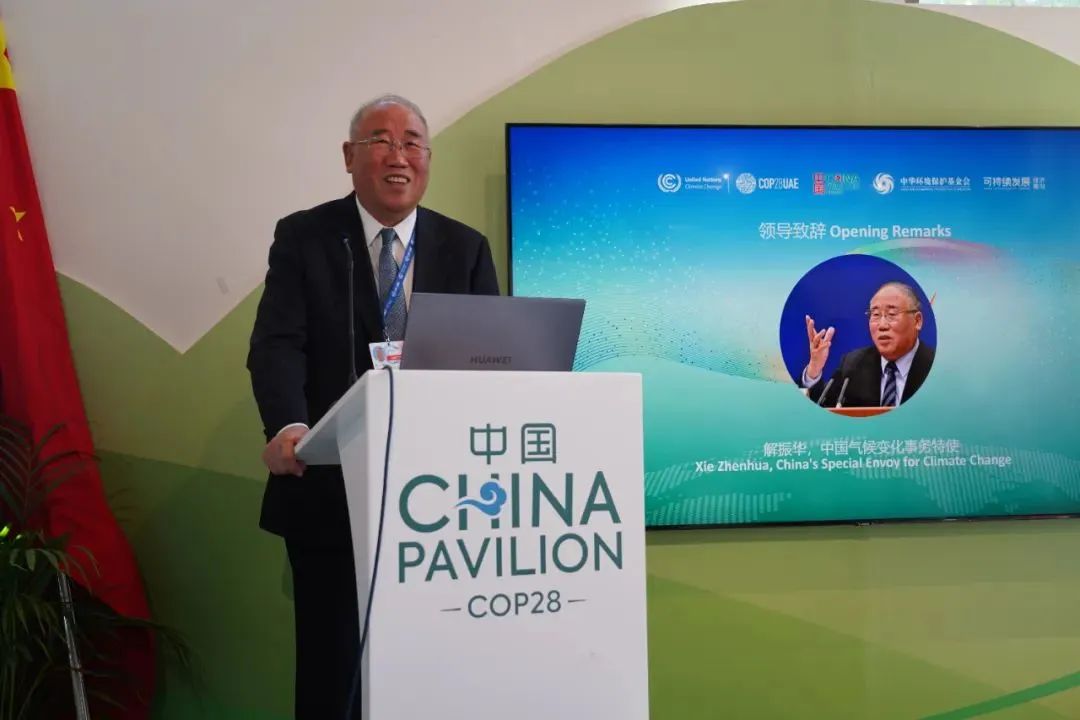
Xie Zhenhua, China's Special Envoy for Climate Change, delivers opening remarks
Xie Zhenhua, China's Special Envoy for Climate Change, delivered opening remarks. He outlined that China’s current efforts in wind power, photovoltaic power generation and new energy vehicles have laid a very sound foundation for energy transition and low-carbon transportation development of both China and even the world. After transition goals and policies are formulated by the government, entrepreneurs will surely invest their capitals and technologies in the market with a grasp of the market trend and development potentials. He emphasized that to address the climate crisis, China needs to not only adjust its energy mix but also change its way of development and people’s ways of life, which requires the concerted efforts from the whole society. He said that if everyone tends to buy low-carbon or zero-carbon products, there will be no market for high-carbon products because they are doomed to be squeezed out of the market.
Xie Zhenhua affirmed the role of social organizations in China’s environmental protection and response to the climate change, as well as their significant contributions to the country’s sustainable development, the Beautiful China Initiative and the ecological conservation. He expressed that social organizations can play a bigger role in encouraging the people to live a low-carbon or zero-carbon life. Low-carbon transition will be accelerated if the people make their right choice together. He also expected that the awareness of green, low-carbon and sustainable development of the whole society can be widely popularized and promoted through the concerted efforts of social organizations, so as to significantly contribute to the development of the country, the world and even future generations.
As the representative of the host, Fang Zhi, Deputy Secretary-General of the CEPF introduced in his welcoming address that the CEPF has long been focusing on fields like climate change and biodiversity in its work; especially in response to the national strategy for carbon peak and carbon neutrality, it has actively carried out public welfare projects such as ecological planting, green transportation, green logistics, green life, solar energy in schools and communities, green and low-carbon scientific research and development projects, promotion of nature-based solutions in schools, and the Energy and Environment Youth Talent Training Program. He particularly mentioned that China's Special Envoy Xie Zhenhua donated the Lui Che Woo Prize (Sustainability Prize) money to the CEPF as the seed money to guide its preparation for establishing the "Zhenhua Green Transition and Sustainability Fund" to support international and domestic efforts on green, low-carbon and sustainable development, which has been receiving attention and support from domestic and foreign institutions and enterprises.
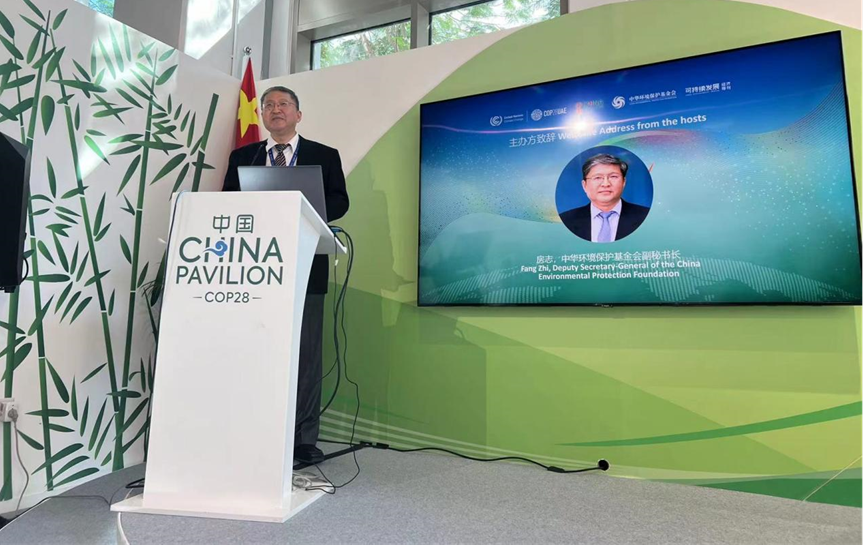
Yu Zhihong, President and Editor-in-Chief of the China Sustainability Tribune, released the Observation Report on Low-Carbon Transition of Enterprises in China 2023 and briefly introduced its core content. He said that over the past three years after China put forward the 30·60 Decarbonization Goal (to peak carbon dioxide emission by 2030 and achieve carbon neutrality by 2060), enterprises have shared an ever-maturing mindset towards carbon emission reduction, and they are gradually aware that carbon emission reduction indicates long-term, beneficial, and sustainable business models. The report summarizes five characteristics of low-carbon practices by enterprises in China: first, harnessing strategic guidance as well as reform and innovation; second, carrying out China’s low-carbon approach through coordinated efforts; third, building partnerships for carbon reduction across the value chain; fourth, accelerating low-carbon transition through digital empowerment; and fifth, achieving preliminary results in climate adaptation efforts.
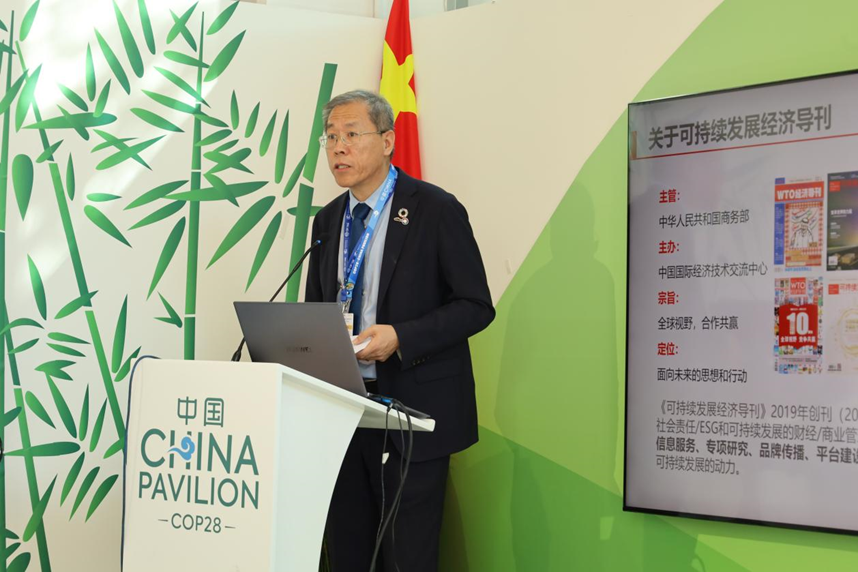
Zou Ji, CEO and President of the Energy Foundation China, pointed out in his keynote speech that converging social powers to tackle climate change is a very important topic. This is because any strategy or policy measure to mitigate climate change will affect the whole. He introduced that in China, there is an iterative process for diverse social powers to reach a consensus on low-carbon transition. China’s modernization and high-quality development have raised the requirements of a new era, and profound changes will occur to its energy mix, industrial structure and employment structure. In his speech, Zou Ji also introduced the project experience of the Energy Foundation China in promoting a just transition in Linfen, Shanxi Province, noting that the model will be expanded to more regions, converging social powers from residents to entrepreneurs, local governments and financing institutions, to advance China's great vision of achieving the 30·60 Decarbonization Goal.
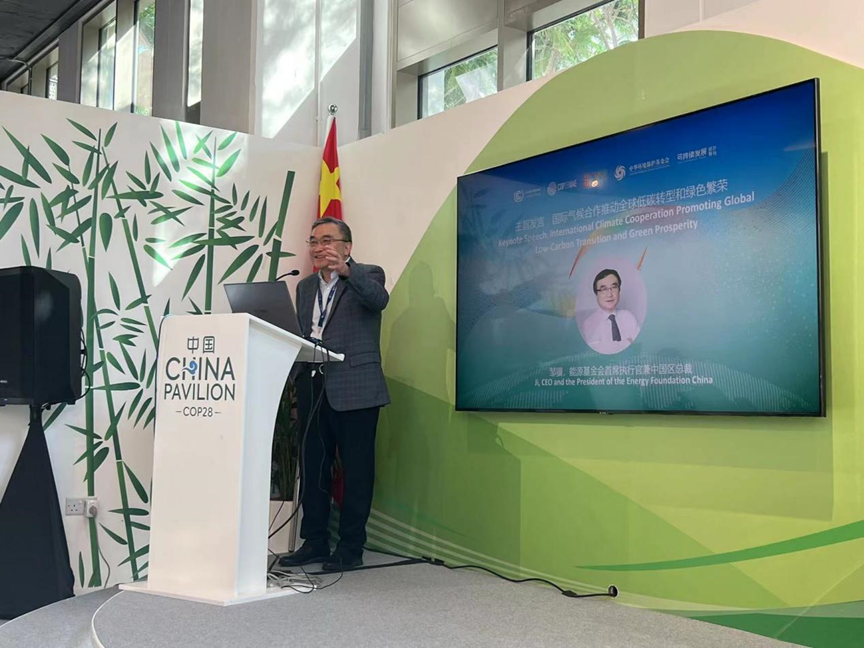
On the event, representatives from CHINT Global, State Grid Wuxi Power Supply Company and Procter & Gamble Company shared their respective practices in promoting low-carbon transition. Cai Jianhua, General Manager of CHINT West Asia and Africa, shared the company's CSR practices in the areas of zero-carbon standardization, self-developed carbon management system, carbon information disclosure, green manufacturing capacity enhancement, zero-carbon action plan, and continuous implementation of ESG concepts. Xu Jiannan, Secretary of Committee for Discipling Inspection & Chairman of the Union, State Grid Wuxi Power Supply Company, introduced via video the work of power supply enterprises in promoting the efficient use of clean energy through optimized power resource allocation; the efforts of exploring new scenarios of clean energy through further promotion of energy structure transformation, as well as the practices of building a collaborative supply pattern between the government and enterprises, to achieve the comprehensive coverage of clean energy in three dimensions in advancing the efficient utilization of clean energy. Rene T. Co, Chief Sustainability Officer and Vice President for Communications of P&G Greater China, presented via video the company’s actions to help green consumption through green products, as well as its outstanding experience in carbon emission reduction, waste management and water management.
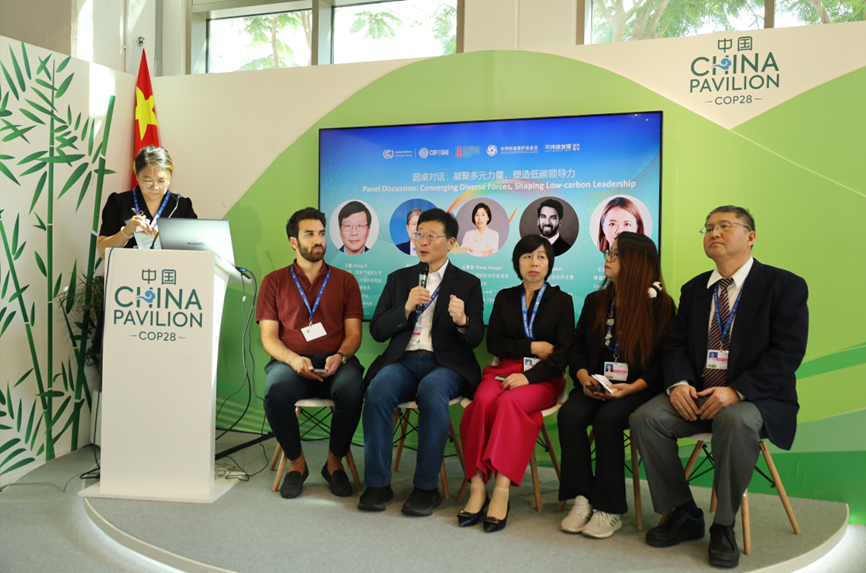
During the panel discussion, guests engaged in in-depth discussions on the topic of “Converging Diverse Forces, Shaping Low-Carbon Leadership”. Wang Yi, Member of the Standing Committee of the National People's Congress, Vice Chair of the National Expert Panel on Climate Change, Researcher at the Chinese Academy of Sciences Institute of Science and Technology Strategy, put forward three suggestions for the better participation of social strengths in climate governance: first, to strengthen the learning of relevant knowledge and improve their own working capabilities; second, to participate in global climate governance in an orderly and rule-based manner to form a synergy; and third, to combine bottom-up and top-down social powers to enrich China’s top-level design of “carbon peak and carbon neutrality” through practices.
Wang Xiangyi, Vice Chairperson and Executive Director of the China Association for NGO Cooperation, pointed out that social organizations play their important roles as advocates, actors and communicators in addressing climate change. She expressed that social organizations can better and more effectively leverage their roles by efforts like strengthening accurate self-positioning, capacity building and platform mechanism development.
To better play the role of the organization in addressing climate change, Fang Zhi, Deputy Secretary-General of the China Environmental Protection Foundation, maintained that the key for the CEPF to be competent to raise funds and utilize them well is to design good projects targeting social or industrial issues and truly promote local, industry and grassroots levels to improve their awareness and capacity to address climate change. He said that the organization can only project a greater performance by adhering to a problem-oriented approach and at the same time, strengthening capacity building, carrying out transparent implementation and promoting experience summary and exchanges.
John Sabet, Director of Business Engagement of Business for Nature shared that the way that businesses operate is changing, and his organization is committed to improving the active engagement of businesses in biodiversity conservation and forming the synergy in addressing climate change and promoting biodiversity conservation. He suggested that companies need to capitalize on their brand influence while making a real difference in their actions and changing their business models.
Wang Huohuo, Director Brand and PR of the LONGi Green Energy Technology Co., Ltd., elaborated on the company’s practices in promoting carbon reduction in its own operations, strengthening green supply chain management, carrying out carbon information disclosure and cooperating with social organizations to promote low-carbon transition. She said that LONGi Green Technology has initiated some social welfare projects with many international organizations and social organizations, and is committed to engaging more public strengths and institutions; meanwhile, LONGi Green Technology has also set up a sustainability week within the company and organized various activities to encourage more employees to take their low-carbon actions.
At the end of the event, Yu Zhihong, President and Editor-in-Chief of the China Sustainability Tribune, Wu Ling, Deputy Director of Communications Department of the CEPF, as well as representatives of relevant enterprises and international and domestic social organizations, released a collective initiative to encourage all sectors of the society to address climate change, calling on all stakeholders, including governmental departments, industry associations, enterprises, social organizations, and international institutions, to utilize their own expertises, actively cooperate with each other and unite their strengths to tackle climate change through concerted efforts.
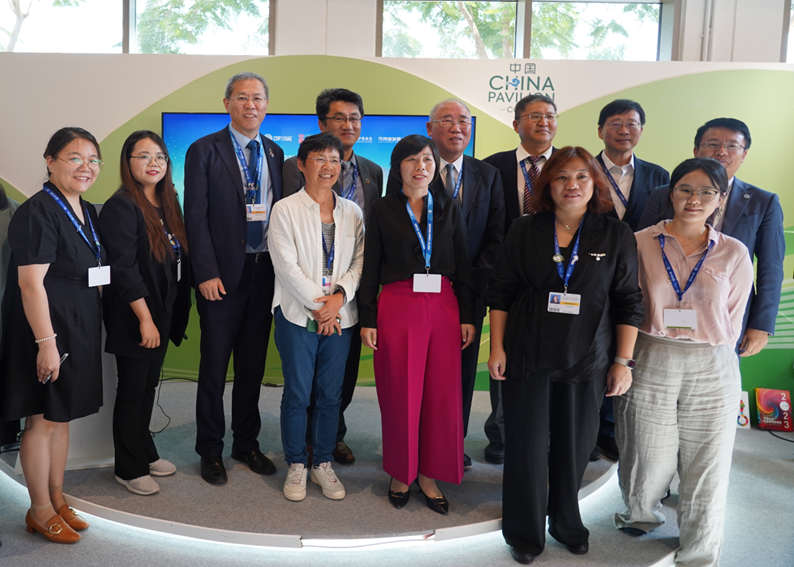
Photo of Xie Zhenhua, China's Special Envoy for Climate Change, and the delegates

 Back
to top
Back
to top